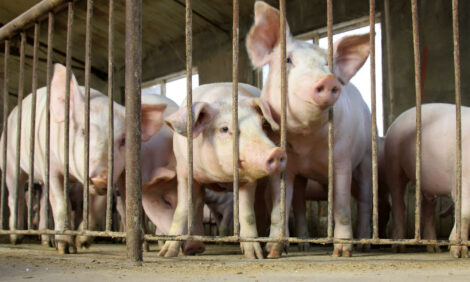



Going Whole Hog: BAC Map Expedites Swine Genome Sequence
US - Genome research is going to the hogs—and humans stand to benefit. |
| While technician Pat Nuss prepares samples for analysis in the background, physiologist John Klindt (left) and geneticist Gary Rohrer evaluate plasma urea nitrogen data from pigs being studied to identify genetic factors affecting protein metabolism. |
A $10 million U.S. Department of Agriculture (USDA) grant is enabling members of the Swine Genome Sequencing Consortium, an international coalition of researchers, to develop a draft sequence of the swine genome.
Gary Rohrer, an animal geneticist at the Agricultural Research Service (ARS) U.S. Meat Animal Research Center in Clay Center, Neb., is leading the ARS swine genome research efforts with help from ARS molecular biologist Dan Nonneman at Clay Center. The grant is from USDA's Cooperative State Research, Education and Extension Service.
The sequencing project has many potential benefits, including improved pork production efficiency, industry growth and reduced risk of swine disease.
The pig genome will be the first mammalian genome to have a complete physical (bacterial artificial chromosome, or BAC) map before being sequenced. Previous genome sequencing efforts for other organisms have used a "whole-genome shotgun" approach to assemble approximately 30 million sequencing segments, similar to assembling a 30-million-piece jigsaw puzzle.
Before receiving the sequencing grant, the consortium had already identified more than 267,000 markers on the BAC map, allowing the researchers to proceed in a more orderly fashion because they already knew where most of the segments belonged. The task will now be more like assembling 25,000 puzzles with 1,200 pieces each.
Other consortium members include the University of Illinois, the Alliance for Animal Genomics in Bethesda, Md., the Wellcome Trust Sanger Institute in England, Scotland's Roslin Institute, the Korean Livestock Institute, the Beijing Genome Institute and France's National Institute for Agricultural Research.
ThePigSite News Desk







